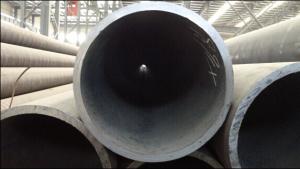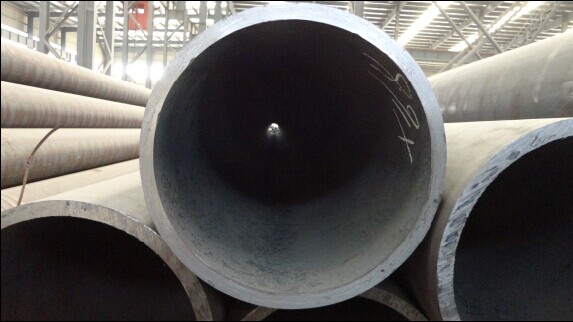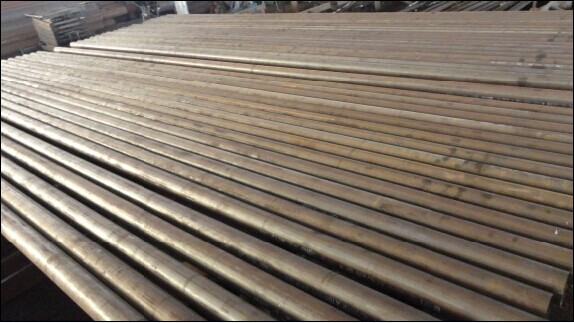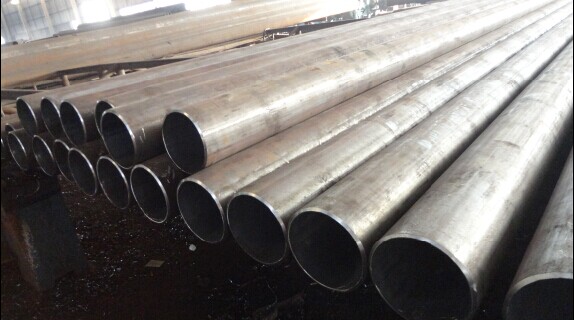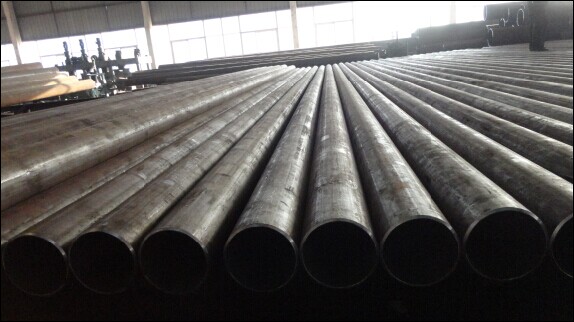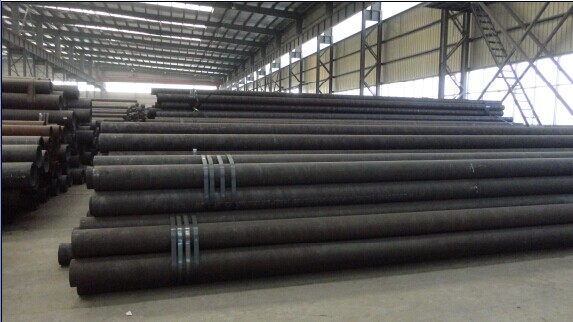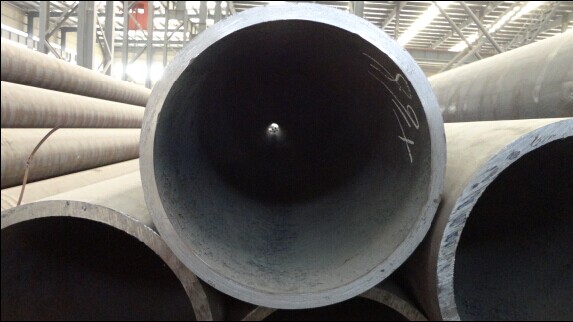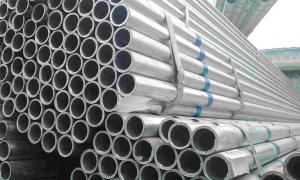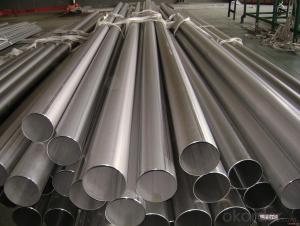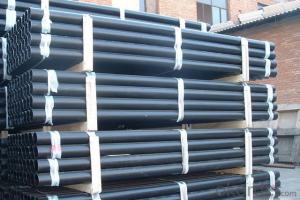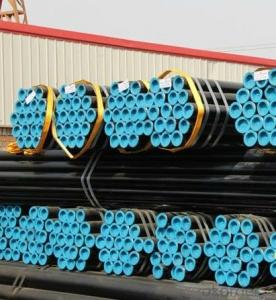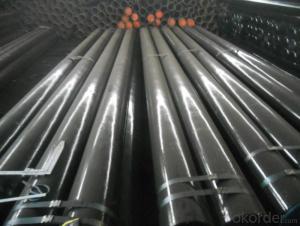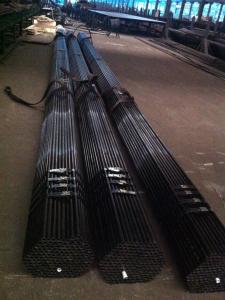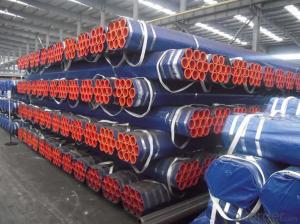ASTM A106 GR.B Seamless Steel Pipes China manufacturer
- Loading Port:
- China Main Port
- Payment Terms:
- TT or LC
- Min Order Qty:
- 30 m.t.
- Supply Capability:
- 12000 m.t./month
OKorder Service Pledge
OKorder Financial Service
You Might Also Like
1、Structure of Seamless Pipe ASTM A106/53:
Seamless pipe is formed by drawing a solid billet over a piercing rod to create the hollow shell. As the manufacturing process does not include any welding, seamless pipes are perceived to be stronger and more reliable. Historically seamless pipe was regarded as withstanding pressure better than other types, and was often more easily available than welded pipe.
Application
carbon seamless steel pipes are widely used in gas, water and oil, transpotation;constructions;Bridge,highway,windows of model steel door; building materials;fences;heating facilities Fluid Pipe;conduit pipe,scaffolding pipe.etc.
Payment Terms: L/C D/A D/P T/T
Packing and shipment
Packaged in bundles,as per customers' requirements, it can also bepackagesd as beveled ends, typed marking, black painting, plastic caps protection,woven bags packing
For 20" container the max length is 5.8m; For 40" container the max length is 12m. other options are available based on customer requests. Please discuss when placing orders.
2、Main Features of the Seamless Pipe ASTM A106/53:
• High manufacturing accuracy
• High strength
• Small inertia resistance
• Strong heat dissipation ability
• Good visual effect
• Reasonable price
3、Seamless Pipe ASTM A106/53 Specification:
Standard | GB, DIN, ASTM ASTM A106-2006, ASTM A53-2007 |
Grade | 10#-45#, 16Mn 10#, 20#, 45#, 16Mn |
Thickness | 8 - 33 mm |
Section Shape | Round |
Outer Diameter | 133 - 219 mm |
Place of Origin | Shandong, China (Mainland) |
Secondary Or Not | Non-secondary |
Application | Hydraulic Pipe |
Technique | Cold Drawn |
Certification | API |
Surface Treatment | factory state or painted black |
Special Pipe | API Pipe |
Alloy Or Not | Non-alloy |
Length | 5-12M |
Outer Diameter | 21.3-610mm |
Grade | 20#, 45#, Q345, API J55, API K55, API L80, API N80, API P110, A53B |
Standard | ASME, ASTM |
Standard: GB/T8162-2008; GB/T8163-2008; GB3087-2008; GB5310-2008; GB9948-2006; ASTM A106/A53 GR.B; API 5L GR.B
Application: Fluid pipes, structural pipes, oil and gas pipes
Packaging: bare/paint, bevelled ends, caps
Material: 20#, Q345B (16Mn)
Outside diameter: 89mm-820mm
Wall thickenss: 4mm-45mm
4、Packaging & Delivery
Packaging Details: | seaworthy package,bundles wrapped with strong steel strip |
Delivery Detail: | 15-30days after received 30%TT |
5、FAQ of Seamless Pipe ASTM A106/53:
①How is the quality of your products?
Our products are manufactured strictly according to national and internaional standard, and we take a test
on every pipe before delivered out. If you want see our quality certifications and all kinds of testing report, please just ask us for it.
Guaranteed: If products’ quality don’t accord to discription as we give or the promise before you place order, we promise 100% refund.
②How about price?
Yes, we are factory and be able to give you lowest price below market one, and we have a policy that “ for saving time and absolutely honest business attitude, we quote as lowest as possible for any customer, and discount can be given according to quantity”,if you like bargain and factory price is not low enough as you think, just don’t waste your time.Please trust the quotation we would give you, it is professional one.
③Why should you chose us?
Chose happens because of quality, then price, We can give you both.Additionally, we can also offer professional products inquiry, products knowledge train(for agents), smooth goods delivery, exellent customer solution proposals.Our service formula: good quality+good price+good service=customer’s trust
SGS test is available, customer inspection before shipping is welcome, third party inspection is no problem.
6、Seamless Pipe ASTM A106/53 Images:
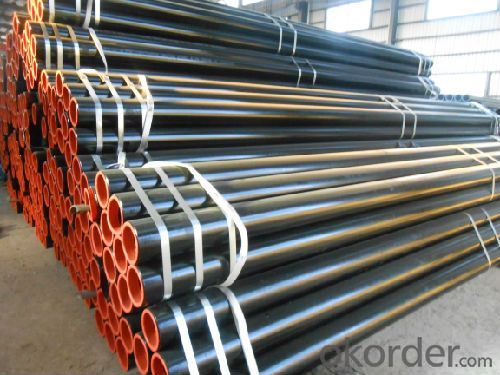
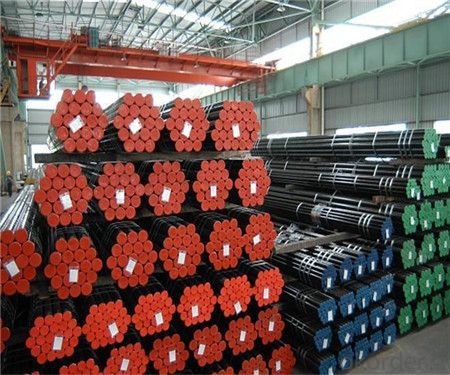
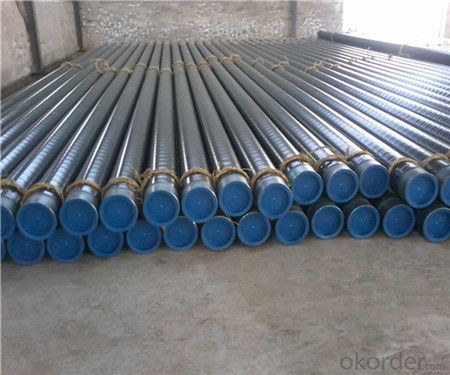
- Q: What is the difference between steel pipes and PVC-U pipes?
- Steel pipes and PVC-U pipes differ in their composition, durability, and application. Steel pipes are made from iron and carbon, providing them with high strength and resistance to extreme conditions. They are commonly used for transporting water, gas, and oil in industrial settings due to their durability and ability to withstand high pressure and temperature. PVC-U pipes, on the other hand, are made from a synthetic plastic called polyvinyl chloride. They are lightweight, corrosion-resistant, and easy to install, making them ideal for residential plumbing, irrigation systems, and drainage. While steel pipes are more robust and suitable for heavy-duty applications, PVC-U pipes are cost-effective, versatile, and suitable for lighter applications.
- Q: When can I use the PVC pipe and when to use the galvanized pipe?
- Galvanized pipes are generally used outside the drying environment or building blocks, and PVC is mainly used for pre embedding in walls or humid environments. If in the ceiling ceiling, below the roof, you need to use galvanized pipe, in the floor below, on the ground you need to use PVC.
- Q: Can steel pipes be used in the oil and gas industry?
- Yes, steel pipes are commonly used in the oil and gas industry. They are known for their high strength, durability, and resistance to corrosion and high pressure, making them suitable for transporting oil and gas.
- Q: How are steel pipes used in the manufacturing of chemical processing equipment?
- Steel pipes are commonly used in the manufacturing of chemical processing equipment due to their durability, corrosion resistance, and ability to withstand high temperatures and pressures. These pipes are used to transport fluids, such as chemicals, gases, and liquids, throughout the various stages of the manufacturing process. In chemical processing equipment, steel pipes are primarily used for two main purposes: as conduits for the transportation of raw materials and as channels for the distribution of processed products. Firstly, steel pipes are used to transport raw materials, such as chemicals and solvents, from storage tanks or external sources to the various processing units within the equipment. These pipes ensure the safe and efficient movement of these materials, allowing for accurate and controlled dosage and distribution. Steel pipes are preferred due to their strength, which enables them to handle the high pressures and temperatures involved in chemical processing. Secondly, steel pipes are used to distribute the processed products throughout the equipment. Once the raw materials have undergone various chemical reactions and transformations, the resulting products need to be transported to the next stage or collected for further processing. Steel pipes are ideal for this purpose as they can withstand the corrosive nature of many chemicals and can handle the high temperatures encountered during these processes. Furthermore, steel pipes are also used in chemical processing equipment for their versatility and compatibility with various chemicals and solvents. They can be easily customized to accommodate specific requirements, such as different pipe sizes, shapes, and fittings. This flexibility allows for efficient design and installation, ensuring a seamless flow of materials and products throughout the equipment. Overall, steel pipes play a crucial role in the manufacturing of chemical processing equipment by providing a reliable and efficient means of transporting raw materials and distributing processed products. Their durability, corrosion resistance, and ability to withstand high temperatures and pressures make them an essential component in ensuring the safe and efficient operation of chemical processing equipment.
- Q: How are steel pipes used in the construction of stormwater drainage systems?
- Steel pipes are commonly used in the construction of stormwater drainage systems due to their durability and strength. These pipes are used to convey stormwater from various sources, such as streets and rooftops, to designated discharge points, preventing flooding and directing the water away from structures. Steel pipes are ideal for handling the high flow rates and heavy loads associated with stormwater runoff, making them an essential component in the construction of efficient and reliable drainage systems.
- Q: Stainless steel tube, also known as why tube?
- Use can be divided into oil well pipe (casing, tubing and drill pipe etc.), line pipe, boiler tube, mechanical structure, hydraulic prop pipe pipe, cylinder pipe, geological pipe, chemical pipe (high pressure fertilizer pipe, oil cracking tube) and shipbuilding pipe etc.
- Q: Can steel pipes be used for conveying sewage sludge?
- Yes, steel pipes can be used for conveying sewage sludge. Steel pipes have several properties that make them suitable for this purpose. Firstly, steel pipes are strong and durable, able to withstand the pressure and weight of sewage sludge without collapsing or breaking. This is important as sewage sludge can be heavy and contain solids that may put stress on the pipes. Secondly, steel pipes are resistant to corrosion, which is crucial when conveying sewage sludge that often contains corrosive elements. Corrosion-resistant steel pipes can ensure a longer lifespan and minimize the risk of leaks or damage. Additionally, steel pipes can be manufactured in various sizes and diameters, allowing for flexibility in designing sewage systems to meet specific requirements. However, it is important to note that proper maintenance and regular cleaning should be carried out to prevent the buildup of sludge and maintain the efficiency of the pipes.
- Q: What does cathodic protection of steel tubes mean?
- Applied current: a macro cell consisting of a protected metal piece and an insoluble auxiliary component. The negative electrode of the battery is connected to the metal to be protected. The power supplies the electrons so that the metal is not corroded by missing points.
- Q: What is galvanized steel pipe?
- Galvanized steel pipe is a type of steel pipe that has been coated with a layer of zinc, which helps protect it from corrosion and rust. This coating also increases the pipe's longevity and makes it suitable for various applications, including plumbing, construction, and outdoor structures.
- Q: How are steel pipes used in the construction of nuclear power plants?
- Steel pipes are used in the construction of nuclear power plants for various purposes, such as transporting and containing fluids and gases, including coolant, steam, and compressed air. They are specifically chosen for their high strength, durability, and resistance to heat and pressure. Steel pipes are used in the construction of primary and secondary cooling systems, reactor vessels, and other critical components, ensuring the safe and efficient operation of nuclear power plants.
Send your message to us
ASTM A106 GR.B Seamless Steel Pipes China manufacturer
- Loading Port:
- China Main Port
- Payment Terms:
- TT or LC
- Min Order Qty:
- 30 m.t.
- Supply Capability:
- 12000 m.t./month
OKorder Service Pledge
OKorder Financial Service
Similar products
Hot products
Hot Searches
Related keywords
